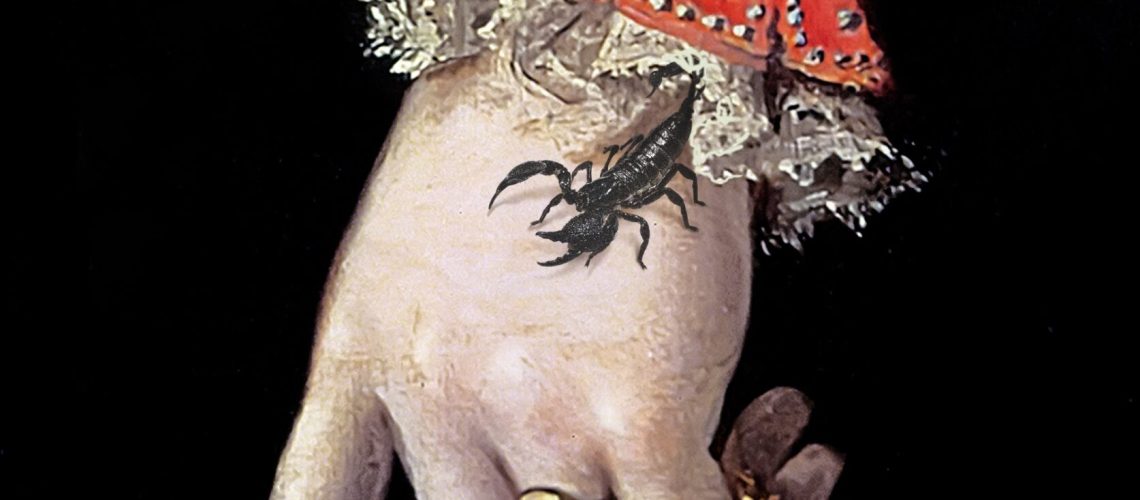A Book by its Cover is a monthly joke column featuring a review based on the cover of a book and nothing else. Any similarities in our review to the actual book are purely coincidental and proof that we are awesome. You can find a true informational blurb about the novel here, and can purchase an actual copy of the very real book here.
“Quite generally, the familiar, just because it is familiar, is not cognitively understood.”
– Georg Wilhelm Friedrich Hegel (Phenomenology of Spirit)
It is a truth rarely acknowledged that bestselling author Leigh Bardugo represents a pseudonym for noted Critical Theorist, and emeritus professor of Continental Philosophy at Universität Kornweschte, Cora Hühnerleber. In each of her novels so far, Hühnerleber (or Bardugo if we are to play along with the deceit) has adapted essential concepts of German idealist works into historical fantasies and cookbooks. With The Familiar, Bardugo delves into the Hegelian concept of the term, with most of her inspiration drawing from Hegel’s 1807 masterwork, Phänomenologie des Geistes (Phenomenology of Spirit.)

Like its Hegelian source, The Familiar is a novel about the shapes spirit adapts along the path to becoming pure knowledge. While this likely makes perfect sense to people within the simple philosophical context, the more highbrow reader will surely appreciate how Bardugo plays with a lighthearted Hegelian concept and complicates it within an esoteric historical fantasy plot.
It is 1466. Against her wishes, Elizabeth of Brandenburg is to marry Count Eberhard II of Württemberg, an antisemitic megalomaniac who plots to take over the Holy Roman Empire by harnessing the forces of Hell. Before leaving home, when things look darkest, Elizabeth receives a precious gift of magical jewelry from her mother, Margaret of Baden. It is a bracelet of golden links, each a unique piece added by a woman down the maternal line of succession, starting with Agatha, the enigmatic mother of Saint Margaret of Scotland. With each generation the magic increases, coming closer to the ability to turn spirits into fully corporeal form.
Racing against time to stop Count Eberhard’s machinations, Elizabeth must covertly reach out to elements of resistance in the area and learn to master her magic to locate and bind a familiar that they can use to balance and fight back against the dark magic that is rising. And she has to manage all that while maintaining noble airs and court. Though Elizabeth finally manages to bind a familiar and manifest it in the form of a scorpion, this just might represent a deadly weapon that proves too difficult to control, putting the land at risk even if Eberhard is stopped.
Despite her past successes in bringing the generally unapproachable and maligned genre of fantasy into the popular and lucrative world of philosophy, Bardugo’s work has attracted some criticism even while sitting atop international bestseller lists. For instance, Calliope Chronis, writing for the Los Angeles Review of Books, argued in their critique of Bardugo’s Seige and Storm: “Somehow Alina’s journey and the powers of the Darkling never manage to set in motion a plot that approaches the rich entertainment or vivid sturm und drang magic of Friedrich Schiller’s original Über die tragische Kunst.”
Bardugo has a leg up here with Hegel for The Familiar, in that no less than Jean Hyppolite dismissed Phenomenology of Spirit as little more than a romanticized Bildungsroman of Spirit as protagonist. All that Bardugo had to do here was change Spirit for Elizabeth and symbolize the transformation inherent in Hegel’s concepts to the ghost familiar, bound in the shape of the scorpion.
As great a job as Bardugo does, some readers might find the climax of the novel very difficult to get through with its cinematic descriptions of the harrowing Nürtingen fire that breaks out as Elizabeth completes transformation of the scorpion into power manifested as knowledge. The action and fantasy can read a bit stale or dry, but thankfully there are enough lively philosophical excursions that get into the Hegelian minutiae that most readers would crave.
A Book by its Cover is a monthly joke column featuring a review based on the cover of a book and nothing else. Any similarities in our review to the actual book are purely coincidental and proof that we are awesome. You can find a true informational blurb about the novel here, and can purchase an actual copy of the very real book here.







